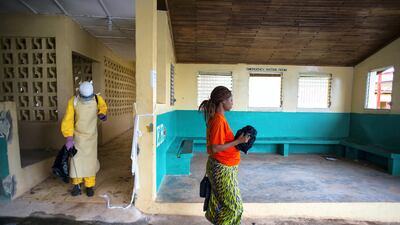"Please wash your hands before coming in," says Kerson Saykor, the manager of Phebe Hospital, gesturing to the chlorinated water barrel at the front door.
Strict hand hygiene rules have been in force in all Liberian hospitals since the Ebola outbreak, but at Phebe, a remote facility deep in the Liberian rainforest, staff learned the lesson the hard way.
In the mid-summer of 2014, when the virus was still largely confined to neighbouring Lofa county, a pregnant woman came in with birth complications. The staff helped deliver her baby, unaware that she had lied about where she came from. By the time they found out she was from one of Lofa's most infected regions, it was too late for both her and them.
"Even though we'd heard about Ebola by then, the nation as a whole wasn't taking precautionary measures," said Mr Saykor, whose staff at the time had little idea how to spot Ebola symptoms, much less treat an infected patient. "The pregnant woman became sick from Ebola and six nurses who had come into contact with her here died as well."
Whether all the nurses died from direct contact with the patient, or passed the virus on from one to another, nobody really knows. Either way, the rest of the hospital staff did not hang about to find out. Most refused to go anywhere near the hospital again until it could promise them safety training, forcing it to all but close its doors.
"It was a very difficult period,” Mr Saykor said. “Everyone who worked in the hospital was worried that their colleagues had the virus, until proven otherwise. We were still having to interact with each other not knowing who to trust, and every few days you would hear that someone had died."
What was a frightening time for the staff was equally hard for the patients, with many acutely ill people being turfed out because of a lack of staff to care for them. By early August of 2014, the 200-bed facility had just one patient, a three-year-old girl suffering from a bout of malaria.
Security guards at the facility were carrying clubs studded with nails in case would-be patients did not take kindly to being turned away. And in a patch of bush in a nearby village, a freshly dug grave contained the body of an elderly man who had died shortly after being told to vacate his hospital bed. With no other hospital open within a hundred miles, he simply had nowhere else to go.
Things did not begin to return to normal until later that year, when Bong county got its own Ebola treatment unit and staff at Phebe began getting the specialist safety training they had lacked.
One of the hospital's doctors, Melvin Korkor, contracted Ebola along with the six nurses but survived after four days in a treatment unit. A devout Christian, he later toured Bong county's churches, explaining to locals that Ebola was not a divine curse but an avoidable medical disease.
But for Mr Saykor, the hospital manager, the most powerful message about the perils of Ebola can be found today in the hospital's "palaver" hut, or meeting house.
There, etched in grey concrete, is a memorial to the six nurses and two hospital drivers who "lost their lives in active service during the Ebola crisis".
"We are very grateful to our colleagues for their dedication," said Mr Seykor. "But the Ebola crisis also taught us that if you don't follow the right procedures, you will die."
_______________
Read more:
Liberia undertakers still haunted by Ebola after outbreak declared over
Liberia's Nyenswah recalls 'terrifying' Ebola crisis
Disco Hill Cemetery: The Ground Zero of Liberia's Ebola crisis
________________

